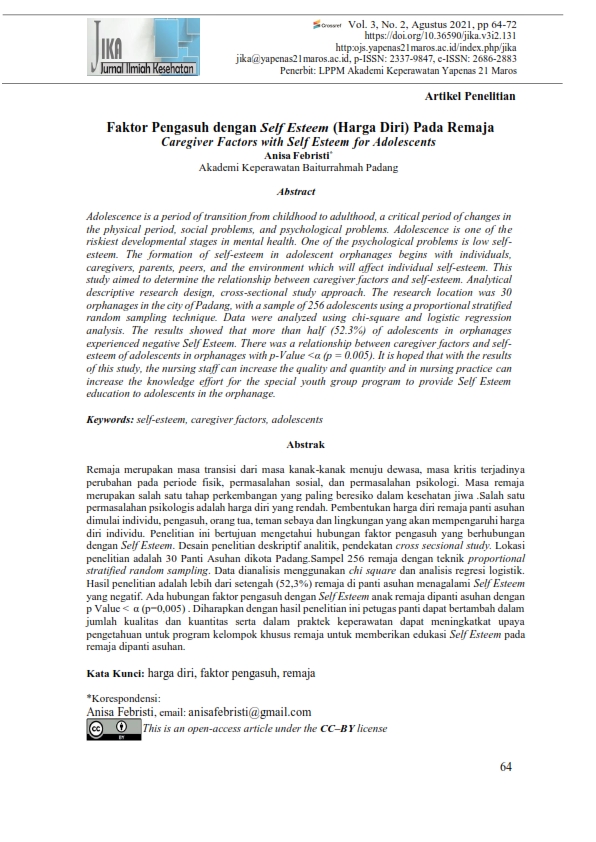Caregiver Factors with Self Esteem for Adolescents
DOI:
https://doi.org/10.36590/jika.v3i2.131Keywords:
self-esteem, caregiver factors, adolescentsAbstract
Adolescence is a period of transition from childhood to adulthood, a critical period of changes in the physical period, social problems, and psychological problems. Adolescence is one of the riskiest developmental stages in mental health. One of the psychological problems is low self-esteem. The formation of self-esteem in adolescent orphanages begins with individuals, caregivers, parents, peers, and the environment which will affect individual self-esteem. This study aimed to determine the relationship between caregiver factors and self-esteem. Analytical descriptive research design, cross-sectional study approach. The research location was 30 orphanages in the city of Padang, with a sample of 256 adolescents using a proportional stratified random sampling technique. Data were analyzed using chi-square and logistic regression analysis. The results showed that more than half (52.3%) of adolescents in orphanages experienced negative Self Esteem. There was a relationship between caregiver factors and self-esteem of adolescents in orphanages with p-Value <? (p = 0.005). It is hoped that with the results of this study, the nursing staff can increase the quality and quantity and in nursing practice can increase the knowledge effort for the special youth group program to provide Self Esteem education to adolescents in the orphanage.
Downloads
References
Abdallat Muhannad MA. 2012. Actual Self-Image, Ideal Self-Image and the Relation between Satisfaction and Destination Loyalty. Journal of Tourism & Hospitality. 1(4): 1-11. https://doi.org/10.4172/2167-0269.1000102.
Asif Ammara. 2017. Self-Esteem and Depression among Orphan and Non-Orphan Children. MedCrave Group LLC July: 1–29.
Badan Pusat Statistik. 2017. Jumlah Remaja di Indonesia. BPS Jakarta.
Badan Pusat Statistik. 2018. Jumlah Remaja di Indonesia. BPS Jakarta.
Bettmann, Joanna E, Jamie M. Mortensen, and Kofi O. Akuoko. 2015. Orphanage Caregivers’ Perceptions of Children’s Emotional Needs. Children and Youth Services Review. 49: 71–79. https://doi.org/10.1016/j.childyouth.2015.01.003.
Castillo, Jason T, Christian M. Sarver, Joanna E. Bettmann, Jamie Mortensen, and Kofi Akuoko. 2012. Orphanage Caregivers’ Perceptions: The Impact of Organizational Factors on the Provision of Services to Orphans in the Ashanti Region of Ghana. Journal of Children and Poverty 18 (2): 141–60. https://doi.org/10.1080/10796126.2012.710484.
Febristi Anisa. 2020. Hubungan Faktor Individu Dengan Self Esteem (Harga Diri) Remaja Panti Asuhan di Kota Padang Tahun 2019. XIV (01): 8–18.
Gandaputra Androe. 2017. Gambaran Self Esteem Remaja Yang Tinggal Di Panti Asuhan. Jurnal Psikologi 7 (2): 52–70.
Hurlock, Elizabeth. 2012. Psikologi Perkembangan, Suatu Pendekatan Sepanjang Rentang Kehidupan (Edisi Ke Lima).
Kalin, Michael, Sambanis Nicholas. 2018. How to Think About Social Identity. Annual Review 21. (239): 239–60.
Kiling Beatriks Novianti. 2015. Tinjauan Konsep Diri Dan Dimensinya Pada Anak Dalam Masa Kanak-Kanak Akhir. Jurnal Psikologi Pendidikan & Konseling. 1: 116–24.
Kraja Pranvera. 2014. Self-Concept and Self-Evaluation in the Transition From Primary To Lower Secondary Education. The Eurasia Proceedings of Educational & Social Sciences. 1 (2): 420–26.
Krismawati Yeni. 2018. Teori Psikologi Perkembangan Erik H. Erikson Dan Manfaatnya Bagi Tugas Pendidikan Kristen Dewasa Ini.” Kurios 2 (1): 46. https://doi.org/10.30995/kur.v2i1.20.
Llapo, Onneeetse Puna. 2015. Caregivers Perception of Emotional and Behavioural Difficulties Experienced by Teenage Orphans Living in Mogapi (Botswana). University of The Witwatersrand.
Martin, Cherie. 2015. Caregiver Perspectives on Psychosocial Support Programming for Orphans and Vulnerable Children in South Africa : A Non- Govermental Organization Case Study. University of Ottawa.
Maundeni, Tapologo, and Tumani Malinga-Musamba. 2013. The Role of Informal Caregivers in the Well-Being of Orphans in Botswana: A Literature Review. Child and Family Social Work 18 (2): 107–16. https://doi.org/10.1111/j.1365-2206.2011.00820.x
Minev M, B. Petrova K. Mineva, M. Petkova, and R. Strebkova. 2018. Self-Esteem in Adolescents. Trakia Journal of Science. 16 (2): 114–18. https://doi.org/10.15547/tjs.2018.02.007.
Muhith Abdul. 2015. Pendidikan Keperawatan Jiwa. In Teori Dan Aplikasi Keperawatan Jiwa. Yogyakarta: CV. Andi Offset.
Nurliana Yetti. 2017. Konsep Diri Remaja.Psikologi & Kemanusian. 4 (2): 978–79.
Permensos. 2011. Peraturan Menteri Sosial Tentang Standar Nasional Pengasuhan Anak Untuk Lembaga Kesejahteraan Sosial Anak.
Preckel, Franzis, Christoph Niepel, Marian Schneider, and Martin Brunner. 2013. Self-Concept in Adolescence: A Longitudinal Study on Reciprocal Effects of Self-Perceptions in Academic and Social Domains. Journal of Adolescence 36 (6): 1165–75. https://doi.org/10.1016/j.adolescence.2013.09.001.
Priyanka, Ashok Parasar, and Roshan Lal Dewangan. 2018. A Comparative Study of Self Esteem and Level of Depression in Adolescents Living in Orphanage Home and Those Living With Parents. International Journal of Humanities and Social Science Research. 4 (2): 51–53.
Reardon, Candice, Gavin George, Collins Mucheuki, Kaymarlin Govender, Tim Quinlan, Samuel Ojima Adejoh, Deborah Tolulope Esan, et al. 2018. Empowering Caregivers of Orphans and Vulnerable Children in Swaziland. African Journal of AIDS Research. 8 (1): 1–6. https://doi.org/10.15406/jpcpy.2018.09.00498.
Resty Gharmish Tiara. 2016. Pengaruh Penerimaan Diri Terhadap Harga Diri Remaja Di Panti Asuhan YAtimputri Aisyah Yogyakarta. Acta Universitatis Agriculturae et Silviculturae Mendelianae Brunensis. 16 (2): 39–55. https://doi.org/10.1377/hlthaff.2013.0625.
Schemmel Christian. 2018. “Real Self-Respect and Its Social Bases.” Canadian Journal of Philosophy 5091: 1–24. https://doi.org/10.1080/00455091.2018.1463840.
Stuart Gail W. 2012. Principles and Practice of Psyhchiatric Nursing. Missouri: Elsevier Ltd.
Syawaluddin, and Mega Iswari. 2015. “Jurnal Konseling Dan Pendidikan.” Jurnal Konseling Dan Pendidikan. 2 (1): 55–61.
Upamannyu, Nischay Kumar, Garima Mathur, and S.S Bhakar. 2014. “The Connection between Self Concept (Actual Self Congruence & Ideal Self Congruence) on Brand Preferences.” International Journal of Management Excellence. 3 (1): 308. https://doi.org/10.17722/ijme.v3i1.126.
Webb Carrie. 2014. “Self Esteem in Pre-Teen Girls.” Dominican University of California. Dominican University.
Widiarti, Pratiwi Wahyu. 2017. “Konsep Diri ( Self Concept ) Dan Komunikasi Interpersonal.” Informasi Kajian Ilmu Komunikasi 47 (1): 135–48.
WHO. 2015. Pengelompokan Usia. New York.
WHO. 2017. Health Adolescence 2017. New York.









